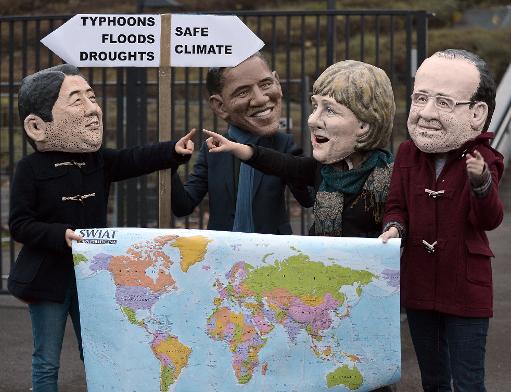
Warsaw Climate Change Conference Inconclusively Concludes
Warsaw Climate Change Conference Inconclusively Concludes

Warsaw-"For the third year in a row the (member) countries have found a new way to say absolutely nothing," asserted Oxfam director Winnie Byanyima, as the U.N.’s annual climate change conference limped inconsequentially to its end on Saturday in Warsaw. The 19th Conference of the Parties (COP-19) to the U.N. Framework Convention of Climate Change (UNFCCC) was supposed to set out a roadmap toward completing a global treaty that would bind all countries to some kind of commitments to reduce their greenhouse gas emissions after 2020 at the Paris COP-21 in 2015. No commitments were made and no clear roadmap was adopted at the Warsaw talks.
Citing the “historical responsibility” of rich countries for causing climate change, China, India, Brazil, South Africa and other developing countries want to maintain the original obligation established in the 1992 UNFCCC that only developed countries are required to do anything about man-made climate change. In the agreement reached at Warsaw, the developing countries, including the largest and fourth largest emitters of greenhouse gases—China and India—forced the rich countries to drop their insistence that all countries make “commitments” to address climate change. Instead, countries will now make vague nationally determined “contributions” toward addressing man-made global warming.
The United States and European negotiators in Warsaw had sought an agreement in which each country would use a common transparent framework for calculating its emissions reductions. In the new Warsaw agreement, countries set their own baselines and define their own reduction strategies, thus making comparisons between countries’ efforts far less transparent and harder to calculate.
The developed country negotiators also wanted all countries to put forward their initial commitments no later than the first quarter of 2015. That deadline would make it possible for the initial commitments to be critiqued before the 2015 Paris conference. The goal of the pre-Paris scrutiny would be to see if they were collectively adequate to keep the world on track toward restraining future global temperatures to an increase of no more than two degrees centigrade. Instead, countries will announce their contributions only when they were good and “ready to do so.”
The poor countries also demanded that the rich countries make commitments to establish a new bureaucratic mechanism under the UNFCCC to compensate them for the loss and damage caused by climate change. For their part, the rich countries did not want to create a new international agency that would be empowered to make them legally liable for weather damage anywhere in the world. The Warsaw agreements reached a compromise in which a Warsaw mechanism for loss and damage will be set up under the existing institutions that are supposed to fund projects that help poor countries to adapt to climate change. That decision, however, will be reviewed after three years.
In 2009, at the Copenhagen climate change conference, the rich countries committed to “mobilizing” $100 billion annually by 2020 to help poor countries to cope with climate change. At Warsaw, the poor countries sought to get the rich countries to pledge that they would hand over $70 billion per year by 2016 as an interim measure. The developing countries also wanted to make it clear that the climate change financing should be “mobilized” from public, not private funds. At Warsaw, the rich countries refused to make specific interim financial commitments, although they did agree to file biennial reports outlining what their plans are for funding climate change adaptation for poor countries between now and 2020.
So the Warsaw conference ended with no firm commitments on either greenhouse gas emissions or on finance. The diplomats and the activists will convene to do it all over again next year in Lima, Peru.
Source: Global Treaty
Kundesupport af UserEcho

